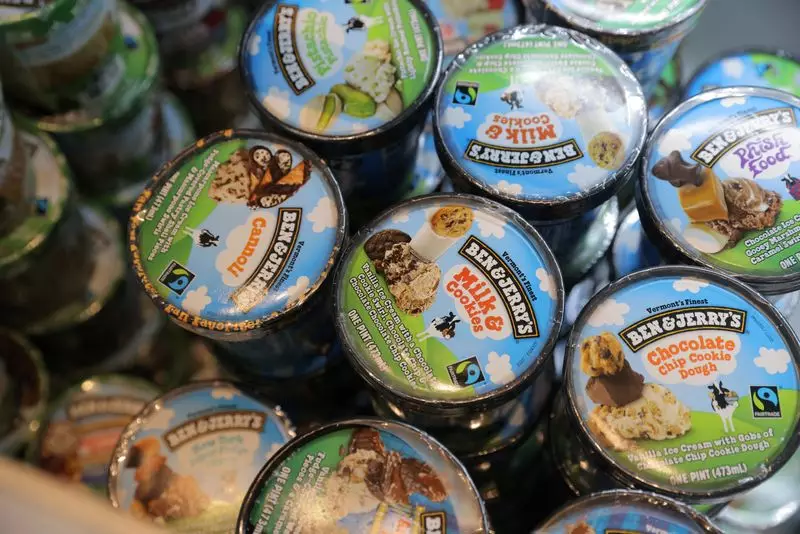Ben & Jerry’s, the iconic ice cream company beloved for its distinctive flavors and progressive values, finds itself embroiled in a contentious legal dispute with its parent company, Unilever. This latest lawsuit symbolizes the complex interplay between corporate governance and corporate social responsibility, showcasing the challenges of maintaining ethical stances in the face of commercial interests.
At the heart of this legal drama is an ongoing rift that surfaced prominently in 2021. The ice cream brand announced its decision to cease sales in the Israeli-occupied West Bank, asserting that continuing operations there contradicted its ethical foundation. This potent stance drew criticism and resulted in certain investors divesting from Unilever, highlighting the significant implications that corporate policies can have on shareholder relations. Following this, the tensions escalated when Ben & Jerry’s pursued legal action against Unilever for transferring its business operations in Israel to a local licensee, allowing the products to be marketed within both the West Bank and Israel. Although that lawsuit reached a settlement in 2022, the current lawsuit underscores the fragile nature of their relationship and the ongoing struggle for corporate autonomy in moral dialogues.
Ben & Jerry’s recent lawsuit accuses Unilever of violating the terms of the 2022 settlement, claiming that the parent company has obstructed its ability to advocate for humanitarian issues affecting Palestinian refugees. The ice cream brand states that it has made multiple attempts to publicly express its positions on pressing matters such as the Gaza conflict, military aid to Israel, and rights for refugees, but has faced suppression from Unilever. This dynamic raises pertinent questions about the level of independence companies like Ben & Jerry’s truly possess, especially when they are part of larger, profit-driven corporate frameworks.
The lawsuit also reveals a more troubling aspect of corporate governance: the tension between profit maximization and moral leadership. Unilever, as indicated by the lawsuit, has expressed concerns over the potential backlash or negative perceptions that Ben & Jerry’s could face for its outspoken positions, particularly regarding accusations of anti-Semitism. This conflict highlights the broader societal challenge of balancing freedom of expression with the risks that may arise from taking a political stance in a divided environment.
Adding to the complexity of this situation, the lawsuit notes that Unilever had agreed to financial provisions allowing Ben & Jerry’s to support human rights organizations of its choosing. However, Unilever’s objections regarding the selection of recipients such as Jewish Voice for Peace reveal the underlying tensions. This not only calls into question the integrity of Unilever’s commitment to the settlement agreement but also raises valid concerns about how corporations navigate the ethical landscape when financial and public relations interests collide.
Corporate Social Responsibility (CSR) has become an increasingly important consideration for consumers, and brands like Ben & Jerry’s have been particularly vocal about their values since their inception. Nevertheless, reliance on a more extensive corporate structure, in their case Unilever, can complicate these values when business ethics come into conflict with shareholder interests. As such, it can lead to perceived compromises in brand integrity, which could undermine the very thing that has drawn consumers to the brand in the first place.
The ongoing friction between Ben & Jerry’s and Unilever transcends this single lawsuit, reflecting a more extensive conversation about the responsibilities of corporations in socio-political matters. As consumer expectations evolve and priorities shift towards greater corporate accountability, brands must navigate the fine line between their ethical policy positions and the realities of corporate governance.
Unilever’s decision to potentially spin off its ice cream business by 2025 could fundamentally shift the landscape for Ben & Jerry’s. Without the looming influence of a sprawling multinational parent company, Ben & Jerry’s may find new opportunities to align closely with its original mission. However, this potential change also presents uncertainties regarding the ice cream brand’s true autonomy and its ability to maintain its values in a competitive market.
Ben & Jerry’s legal battle with Unilever encapsulates the broader challenges facing socially conscious brands in today’s divided world. As ESG (Environmental, Social, and Governance) criteria gain momentum, the true test lies in whether corporations can effectively uphold their commitments to social missions without compromising their business realities. The outcome of this case may very well set a precedent for how businesses interact with political and humanitarian issues in the future.

